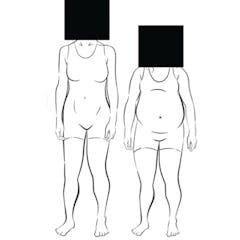
Articles on Overweight
Displaying 1 - 20 of 129 articles

Some people weigh themselves daily, while others have ditched scales altogether. So what does the evidence say?

Sub-Saharan Africa is no longer a continent just grappling with hunger and starvation — it is now also dealing with obesity and overweight.

Weight stigma doesn’t have to be malicious or targeted directly at a person to cause harm. Fat microaggressions lead to poorer health, well-being and life outcomes among fat people.

South Africa’s national survey of food and nutrition security identifies the areas most in need.

Researchers gave people in the study 5, 10 or 15ml doses of apple cider vinegar and found they lost more weight than those taking a placebo. But the findings need a closer look.

Weight loss can seem like an impossible, unachievable task. But you don’t need to lose a lot of weight to start noticing the health benefits.

The demand for off-label weight loss drugs like Ozempic is concerning, because of the impact on weight stigma and the health risks of unsupervised weight loss, including developing eating disorders.

Research shows that focusing strictly on weight loss is not only ineffective in the long term, it can even be harmful and counterproductive.

Obesity is a disease that shares several characteristics with cancer, but does not get the same society-wide recognition of its disease status, so people with obesity are less likely to get treatment.

The BMI does not distinguish between excess body fat, bone mass or musculature. It also does not interpret the distribution of fat, which is a predictor of health.

Researchers asked more than 350 adults to weigh themselves daily or weekly. They found a yo-yo pattern of weight gain over festive periods and cooler months.

Despite the prevalent view that people with large bodies should simply eat less and move more, it’s nearly impossible to fight our genetic heritage or other factors that are not within our control.

Overreliance on BMI as a measure of weight and health has deepened inequities and led to inaccuracies and overgeneralizations.

Here’s what the new WHO guidelines mean for people who have switched to artificial sweeteners for health reasons.

The American Academy of Pediatrics has recently released new obesity management guidelines in order to help address the growing obesity crisis in children.

Permanent weight loss is hard to achieve. But the good news is: there are still benefits to temporary weight loss.

While excess weight arises from a complex interplay of genes, environment, diet and activity, new research finds Americans hold parents responsible for excess weight in their kids.

The risk of developing eye complications is high in young people with Type 2 diabetes, which is increasingly affecting children and adolescents, especially those who are more sedentary.

GPs’ advice on weight loss for people with obesity is often ‘superficial’, but things have improved in recent years.

Do you feel the need to clean your plate? Does a bowl of salty chips seem completely irresistible? Understanding your ‘eating personality’ could stop you eating or drinking too much these holidays.
